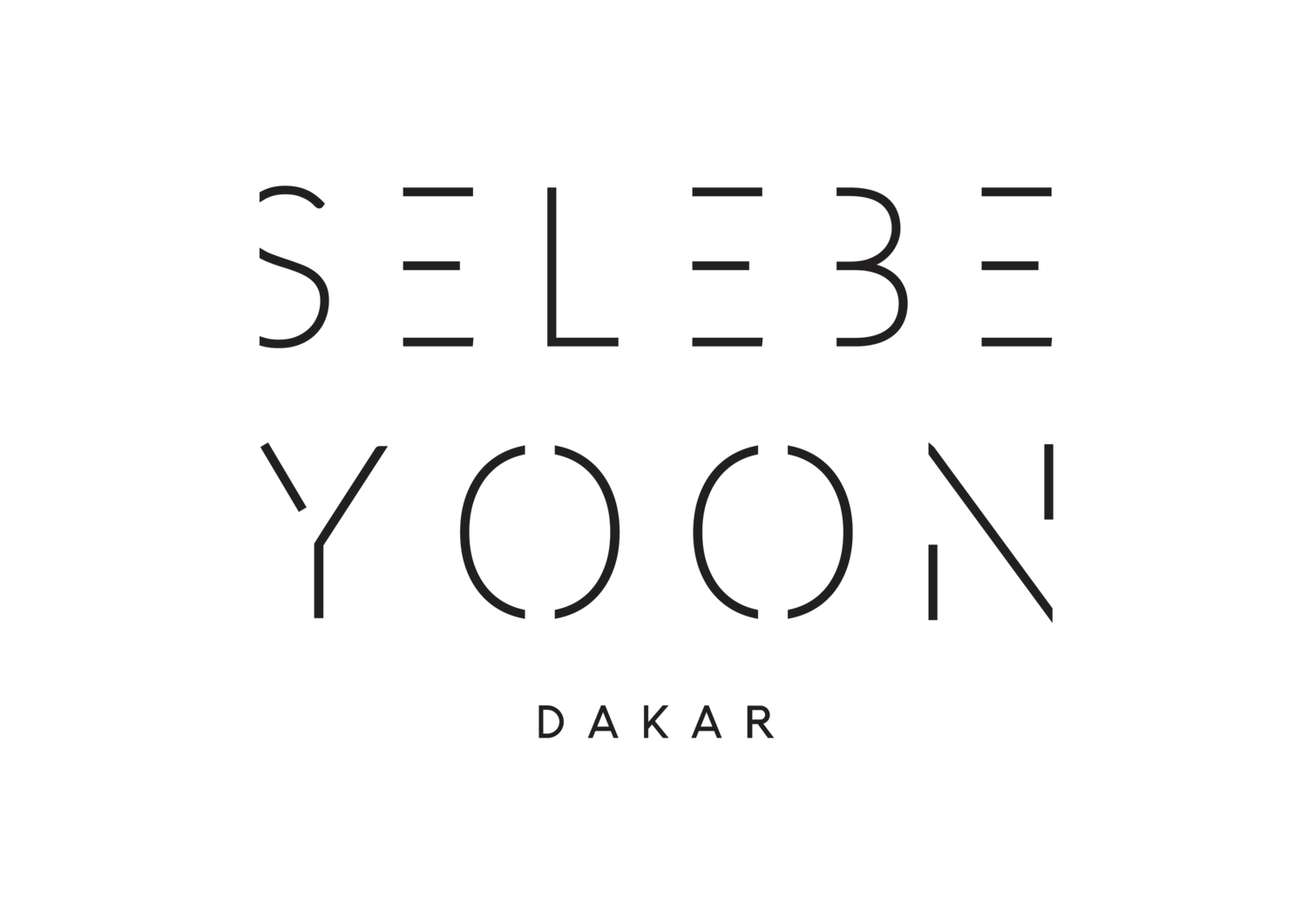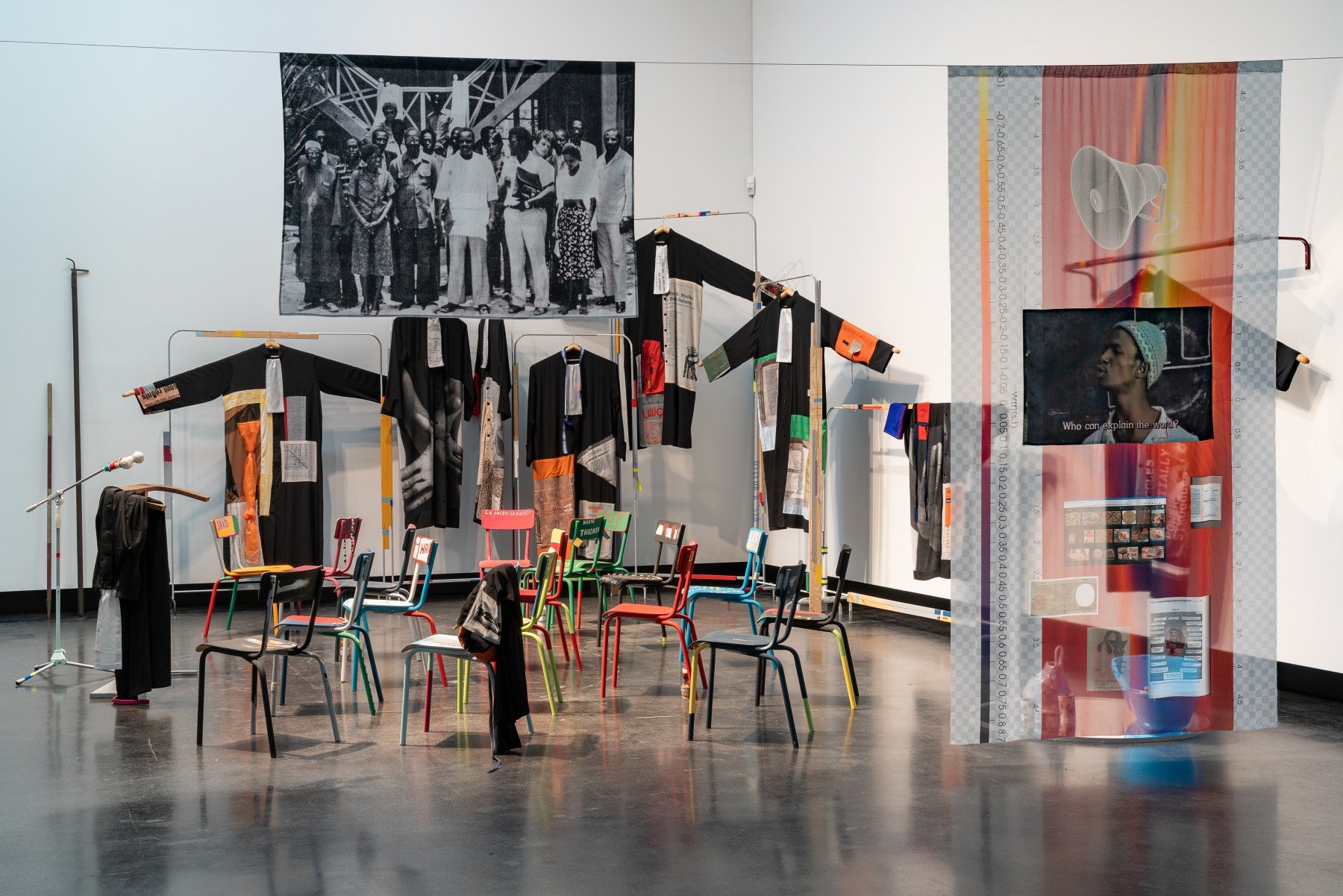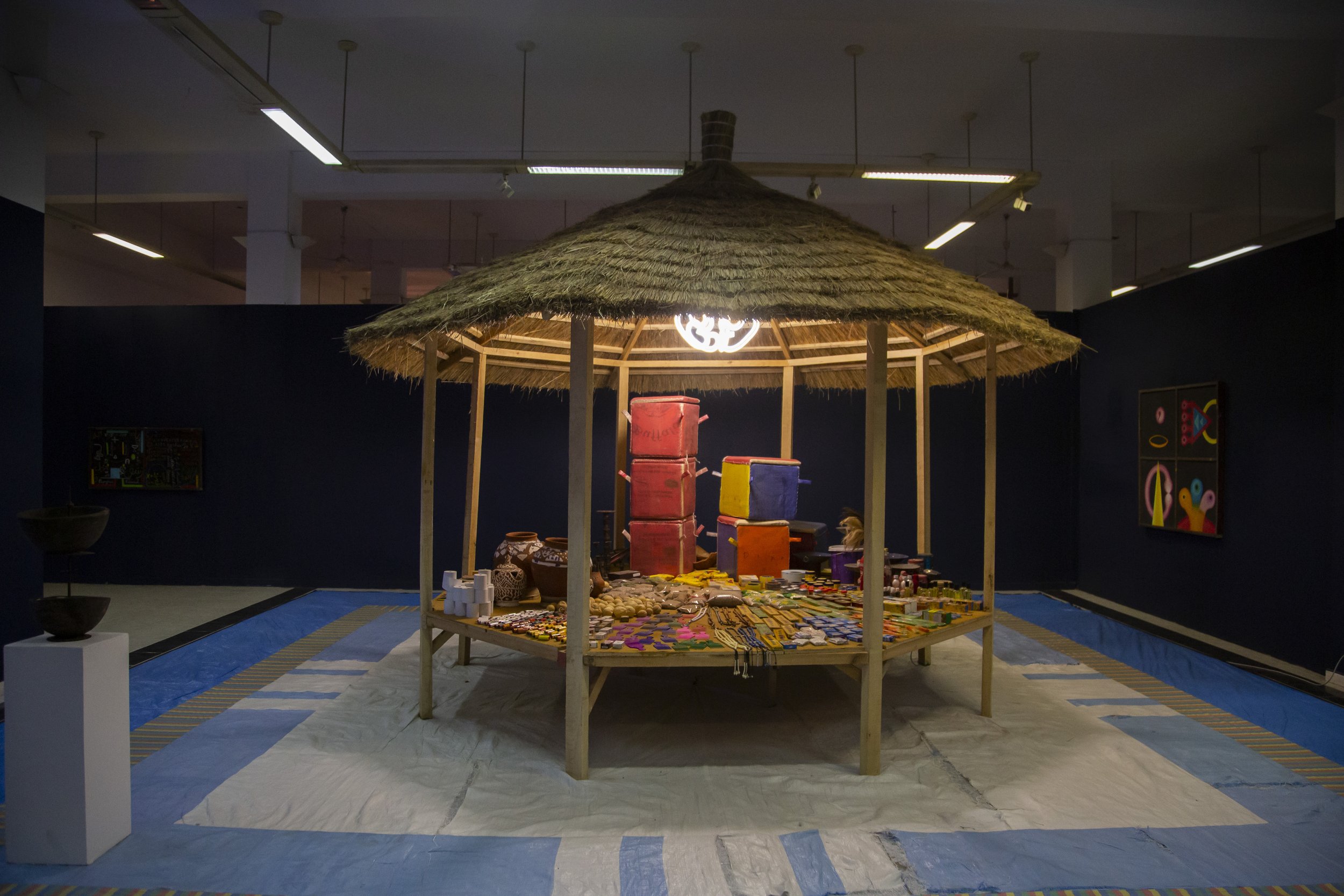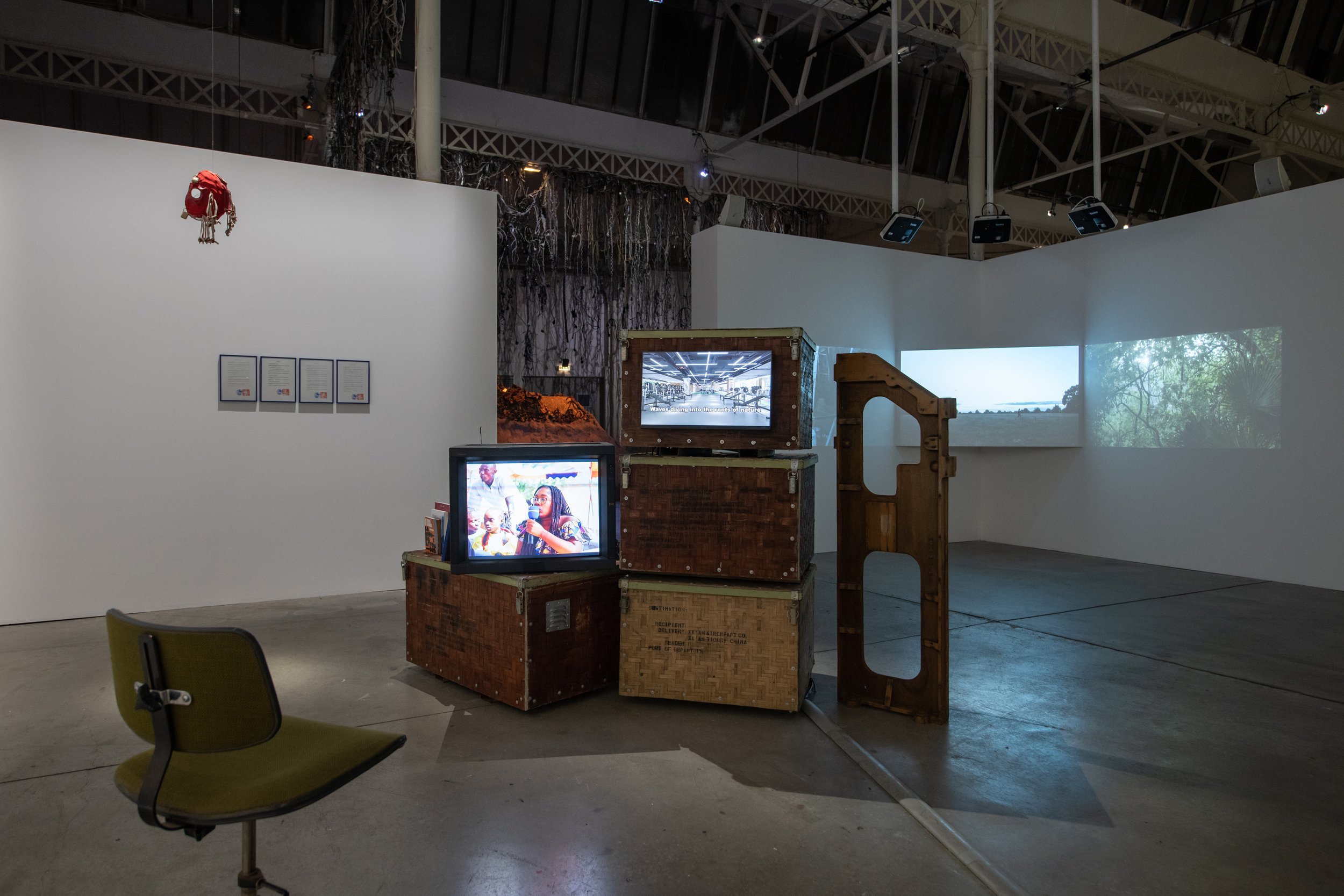Hamedine Kane
Hamedine Kane & Stéphane Verlet-Bottéro, The School of Mutants I, 2019
Recent press
In conversation with Hamedine Kane - GLEAN magazine - 21 October 2023
Presentation by Hamedine Kane - Villa Médicis - (2023-2024)
Hamedine Kane by Valentine Umansky - ElaineAlain - 2023
‘Like Dining on Sawdust’: The 12th Berlin Biennale’s Lack of Imagination - 16 June 2022
The Senegalese-Mauritanian artist and film director Hamedine Kane (b. 1983, Mauritania) lives and works between Brussels, Paris and Dakar.
Hamedine Kane is a Senegalese-Mauritanian multidisciplinary artist, born in Nouakchott, Mauritania. Trained as a librarian, he made his first trip to Europe in 2004 after obtaining a grant to study the book trade in Paris. Shortly afterwards, he settled in Brussels, where he developed his artistic practice around his own experience of migration, turning to film, photography, installation, performance, drawing and engraving. In his work, Hamedine Kane sees borders not as symbols, limits or factors of impossibility, but as places of passage and transformation.
In this way, the border becomes a central element in the conception of an itinerant identity in Kane's work, which he constructs by drawing on the concepts of 'out of place', resulting from a permanent state of exile, and of the 'between worlds', both articulated by Edward Said to describe an existence between countries and cultures - a constant personal and global migration. Navigating the spaces between Africa and Europe, whether in-between, internal or external, Kane often operates in constrained, transitory, temporary environments. His projects are the result of long periods of situational research, both in European museum archives and in conversations with theorists, literary figures, historians and local people far removed from institutionalised circuits. Using archives as raw material, he sees the exhibition as a place for the re-production of knowledge, histories and sensitive spaces.
Kane examines the political, social and cultural phenomena of the post-independence period in several countries on the African continent, notably Senegal and Mauritania. The notions of exile, wandering and injustice, but also of memory, heritage and the awareness that comes with independence and decolonisation, permeate his work. Time becomes a frequent narrator, as much the time of a life as political time. Hamedine Kane emphasises the importance of commitment in his work, calling for a collective acknowledgement of current conflicts. He questions recent history, particularly that of Senegal, and the upheavals and aspirations the country has undergone in just a few decades, using the notion of Afro-utopia, and drawing on African, African-American and African diaspora literature on socio-political commitments.
In 2020, Hamedine Kane released the film "La Maison Bleue", in which he reveals the intimate daily life of Alpha - an artist exiled in the middle of the Calais "Jungle", where thousands of migrants have passed through since the 1990s. By spending several months with him in his house, built in the style of a Fulani dwelling, he reveals his attempts at poetic resistance in a hostile environment marked by political violence. From geographical boundaries to historic buildings where past and present intertwine, the artist documents this zone of passage, a place that is a receptacle for personal and collective histories, where identity is perpetually renegotiated. The film 'La Maison Bleue' received a special mention from the jury at the IFDA in Amsterdam, and was a winner at the Open City Film Documentary in London, the Biografilm Festival in Bologna, the Millenium Documentary Festival in Brussels and the RIDM in Montreal.
"Questioning the notion of literary heritage as a source of contemporary inspiration, my interest in these three writers in particular and in Afro-diasporic literary creation in general in my artistic practice stems from a desire to be part of a continuation, a movement, a filiation, Hamedine Kane talks about his most recent research into three great black American writers who were exiled in Paris in the second half of the 1940s: Richard Wright, Chester Himes and James Baldwin. The project takes the form of action research in the form of a speculative enquiry attentive to 'situated knowledge' (a notion conceptualised by Donna Haraway in 1988), based on a series of testimonies that form the basis of a body of work in which Hamedine Kane focuses on the narratives of the so-called protest novel, specific to these writers, remaining attentive to the experience of violence experienced and suffered, as well as to the refusal of designation expressed in their works.
With Stéphane Verlet-Bottero, in 2018 he co-initiated "The School of Mutants" - a nomadic collaborative art and research project involving artists, craftspeople, activists, theorists, curators but also universities, schools and art centres, aiming to mobilise spaces to produce, transmit and pluralise knowledge without hierarchy, in connection with the socio-cultural, ecological and aesthetic mutations of reality. From the alternative and radical educational projects born in the aftermath of Senegal's independence in 1960, "The School of Mutants" takes up the complex history of post-colonial and pan-African utopian projects and puts it into play through collective investigations, fieldwork, public assemblies, archive research, writing and film production. Through its activities, "The School of Mutants" invites people to think dynamically, deconstructing and then collectively reconstructing the ideologies that underpin the experimental educational structures that are helping to shift paradigms and refocus discourse on the African continent.
Works
Biography
© Sophie Soukias
The Senegalese-Mauritanian artist and director Hamedine Kane (b. 1983, Mauritania) lives and works between Brussels and Dakar.
Trained as a librarian in Nouakchott, he made his first trip to Europe in 2004 and decided to establish himself in Brussels. Currently, Hamedine Kane is a fellow at the Villa Medici in Rome (2023-2024)
Hamedine Kane’s solo exhibitions include: « Inhabitable | Re-imaginer les devenirs », Pointculture, Brussels, Belgium, curated by Aude Tournaye (2019-2020) and et «Salesman of the revolt», Clark House Initiative, Mumbai, India (2018).
He has participated in numerous festivals, biennials and exhibitions in internationally. such as the 35th Ljubljana Biennale of graphic arts, with the School of Mutants, Slovenia (2023); « Dérives en Péninsule », L’Atlas, Paris, France (2023); « Maa ka Maaya ka ca a yere kono », Les Rencontres de Bamako, artistic director: Bonaventure Soh Bejeng Ndikung, Mali (2022); "When Nature Feels", Momenta Biennale, Montreal, Canada, curator: Stephanie Hessler (2021); "What is Forgotten and What Remains," Museum of Immigration History, Paris, France (2021) and Macaal Museum, Marrakech, Morocco (2021); "Words Create Images," Casablanca Biennial, Morocco, curator: Christine Eyene (2021); "Genealogies Futures," La Biennale de Lubumbashi VI, Congo, curated by Sandrine Colard (2019); "Salesman of the revolt," Clark House Initiative, Mumbai, India (2018); "Every Time A Ear Di Sound," Documenta 14, Kassel, Germany curated by Bonaventure Soh Bejeng Ndikung, Elena Agudio and Marcus Gammel (2017).
In 2018, he co-initiated with Stéphane Verlet-Bottero, « The School of Mutants » a collaborative art and research platform that was presented in numerous Biennials and institutions including « N-daffa - Forger », curated by Malick El Hadji Ndiaye, Dakar Biennale (2022); « Still Present! » Curated by Kader Attia, Berlin Biennale, Germany (2022); « You and I don't live on the same planet », Taipei Biennale, curated by Bruno Latour, Martin Guinard, Eva Lin, Taiwan (2020); « UFA-Universities of African Futures »; Lieu Unique, Nantes, France (2020); "The Architecture of Degrowth", Architecture Triennial, Oslo, Norway (2019) to name a few.
His video works have been shown at the Tate Modern in London, England; Kanal Centre-Pompidou in Brussels, Belgium; Kunsthalle Trondheim in Trondheim, Norway; the Sainsbury Center, Norwich, England, among others.
As a filmmaker, his film "The Blue House" has been screened at numerous festivals namely OpenCity Film documentary, London; Biografilm Festival, Bologna; Millennium Documentary Festival, Brussels; RIDM, Montreal. His film The Blue House received a special jury mention at the IDFA in Amsterdam in 2020.
Prior to Villa Médicis, he had several residencies including at the Cité des Arts in Paris (2022), Clark House Initiative, Mumbai, India (2018); Centre d'Ecritures Cinématographiques, Moulin Andé, Normandy, France (2018); Villa Vassilieff, Paris, France (2016) and Kawkaw Residence, le 18, Marrakech, Morocco (2016).














